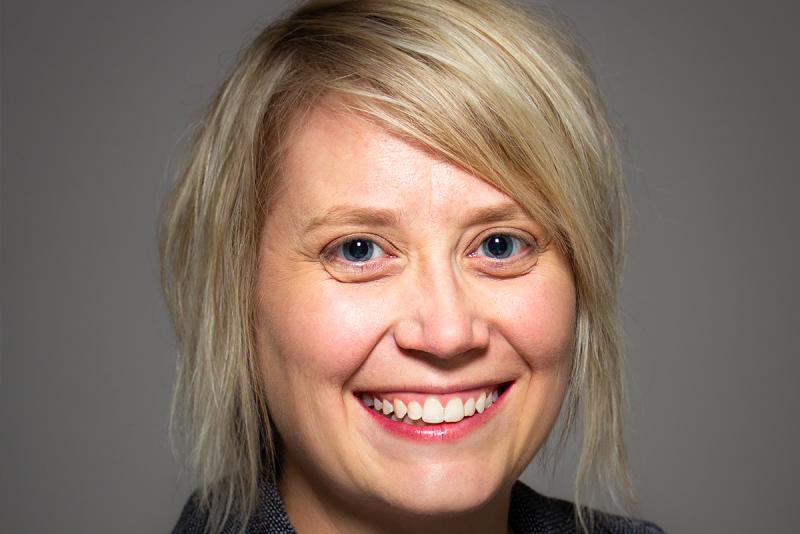Defining Social Justice
Research by Brittanie Atteberry Ash, PhD ’20, seeks to help social work better deliver on its social justice promise

Although the social work profession is grounded in social justice, is it truly just? Recent University of Denver Graduate School of Social Work (GSSW) PhD grad Brittanie Atteberry Ash has been exploring that question, particularly as it relates to social work education.
Her dissertation — “Social Work, Social Justice, and the Causes to Which We Are Called: Attitudes, Ally Behavior, and Activism” — examined the question in depth, reviewing social work’s conceptualization of social justice and how schools of social work deliver on their social justice promise.
“Since social justice is the bedrock of the profession, I wanted to know how social work students think critically, are allies and are action oriented,” Atteberry Ash says. She developed a new instrument, the Critical Orientation to Social Justice Scale, and emailed more than 500 schools of social work asking them to share the survey with their students. Ultimately, 1,467 students from 76 schools nationwide completed the survey, which measured attitudes, allyship and activism related to LGB and transgender communities specifically.
Quantitative findings identified several predictors of attitudes, ally behaviors and activism that schools of social work can influence. These predictors include having courses that teach about power, privilege and oppression and using dialogue as a pedagogical approach. “When students had a higher understanding of social justice, they had more inclusive attitudes and higher rates of activism,” Atteberry Ash explains.
But therein lies a problem. In the 24 years since the National Association of Social Workers introduced social work’s code of ethics, the profession hasn’t arrived at a common conceptualization of social justice, and most definitions of social justice don’t include the role of advocacy — a critical omission, Atteberry Ash contends.
“The profession is overdue in coming together and identifying a cohesive and inclusive definition of social justice,” she wrote. Building on the definition from The Social Work Dictionary, Atteberry Ash has proposed a new definition of social justice that incorporates advocacy and personal agency:
“Social justice means people from all identity groups have the same rights, opportunities, access to resources, and benefits. It acknowledges that historical inequalities exist and must be addressed and remedied through specific measures including advocacy to confront discrimination, oppression, and institutional inequalities, with a recognition that this process should be participatory, collaborative, inclusive of difference, and affirming of personal agency.”
The proposed definition is a place to start, Atteberry Ash says, noting that much more research and discussion within the profession is needed. “Having an agreed-upon definition of social justice within social work would make it possible to systematically begin to understand how social workers are applying social justice to their practice,” she says.
A common definition would also make it possible to address a glaring problem in social work education: accredited schools of social work with discriminatory policies. There are at least 70 schools with such policies, which run counter to social work ethics but not necessarily afoul of accreditation standards. A common understanding of social justice could bring all of social work’s governing bodies into full alignment with the profession’s bedrock principles.
“How do we teach our students to be critically minded, social-justice minded, when our accrediting body is not?” asks Atteberry Ash. In addition to discriminatory policies, she says, there’s no requirement that schools provide stand-alone courses on diversity, social justice and related topics — something her research has shown does make a positive impact on how student embody justice in their own lives and practice.
GSSW requires its students to take the Power, Privilege and Oppression course and has introduced intergroup dialogue processes. Atteberry Ash’s research shows that both of these strategies make a positive impact on students.
“Brittanie’s work challenges us — as practitioners and educators — to grapple with the nuances of our understanding of social justice and shows how the contours of our conceptualization matter deeply. She moves us toward an evidence-based curriculum if we take seriously our ethical commitment to equity,” says Eugene Walls, co-associate dean for doctoral education and Atteberry Ash’s advisor.
Atteberry Ash is among a growing number of social work students and faculty nationwide who have been calling for the Council on Social Work Education, the Group for the Advancement of Doctoral Education in Social Work, and the National Association of Social Workers to adopt anti-racist practices and outcome expectations for MSW students.
“If we’re teaching about social justice and infusing it in practice, we know that students are more inclusive in thinking and more likely to participate in action outside of their schools,” says Atteberry Ash. As a new assistant professor at the University of Texas at Arlington School of Social Work, she says she aims to “embody social justice in my teaching and approach in mentoring students in hopes that I can impact future generations to be critical social workers, to be socially just practitioners, to be antiracist, to interrupt transphobia and microaggressions.”
“That’s why I love social work,” she adds. “It offers such a great hope to impact society.”




